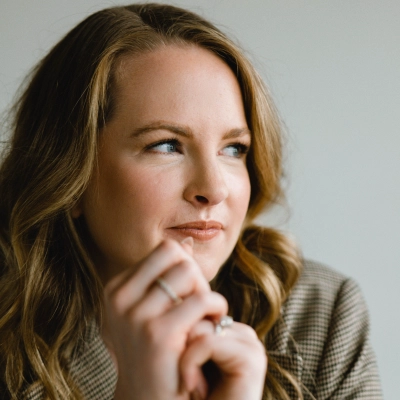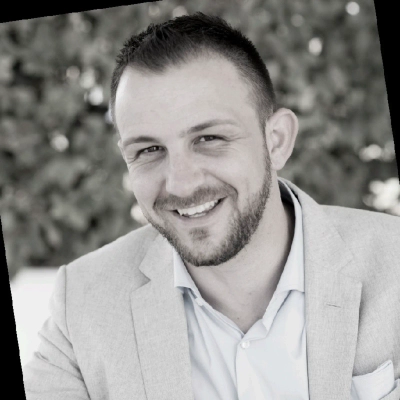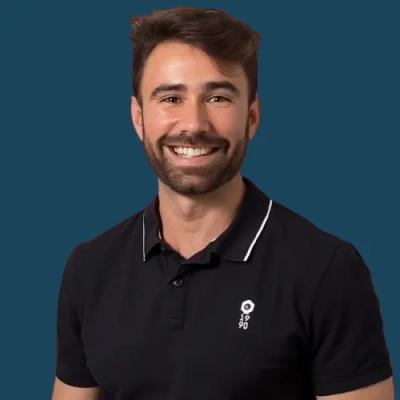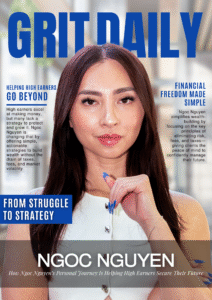Change is inevitable in entrepreneurship, and adapting to it can be the key to success. This article presents valuable insights from experienced entrepreneurs on how to effectively manage and thrive amidst change. Drawing from real-world experiences, these experts share practical strategies for turning challenges into opportunities.
- Embrace Change as a Growth Opportunity
- Define Guiding Principles for Adaptation
- Remain Open to Feedback and Evolution
- Design Your Business for Constant Change
- Authenticity Trumps Polish in Branding
- Scale Services While Maintaining Personal Touch
- Trust Your Intuition During Pivotal Moments
- Evolve Your Methods While Preserving Core Values
- Push Boundaries and Learn from Mistakes
- Delegate to Enhance Adaptability
- Tailor Approaches to Individual Client Needs
- Know When to Close a Failing Venture
- Pivot Quickly Based on Market Realities
- Transform Vision into Traction Through Flexibility
- Take Action to Navigate Inevitable Changes
- See Change as a Guide Not a Threat
- Meet Market Demands While Maintaining Vision
- Treat Your Business as a Living Prototype
Embrace Change as a Growth Opportunity
One of the most important lessons I learned as a first-time entrepreneur is that adaptability is not just about staying in the game. It is how you grow. When I started what would eventually become Steven Mitts Services, I had a strong vision and a clear offer. But like many early businesses, the reality of what the market needed pushed me in a new direction.
In the beginning, I focused on coaching founders. I offered advice, feedback, and strategy. But over time, I realized that most founders needed more than just guidance. They needed someone who could step in and help them build. That was the turning point.
I shifted from being a coach to taking on a fractional leadership role. I started working directly with companies as a fractional CXO. My focus was on marketing, customer acquisition, and building out systems that made growth more efficient. I began using AI and automation to help these businesses scale without having to hire large teams. That allowed them to move faster, save money, and compete more effectively.
This change helped me deliver better results and build a business that aligned with what I do best. It also made the work more rewarding, because I could see the impact in real time.
My advice to other first-time entrepreneurs is simple: Start with a plan, but stay open. The market will show you what works. Your job is to pay attention and respond with focus. You will not get everything right, but standing still is worse than making the wrong move. The businesses that grow are not the ones that never change. They are the ones that know how to.
 Steven Mitts
Steven Mitts
CEO/Founder, Steven Mitts Services
Define Guiding Principles for Adaptation
One of the biggest lessons I’ve learned as a founder is just how exposed you are to the world when you run your own business. When you work for someone else, you get a layer of insulation — you can escalate when things go sideways. When you’re the one in charge, there’s no buffer.
You’re responsible for every curveball, most of which come from the uncertainty of simply working with other humans, which is unpredictable — this can look like client changes, team dynamics, market shifts, tech outages, the economy, and much more. That level of exposure means adaptability is absolutely required to do the job of an entrepreneur.
My best advice is to define your guiding principles early. What do you care about most when push comes to shove? Is it your team’s well-being, profitability, client trust, long-term growth? When you have to pivot, or make tough decisions, you can rely on those principles to guide you. That’s how you adapt without losing yourself or your vision.
 Makena Finger Zannini
Makena Finger Zannini
CEO, The Boutique COO
Remain Open to Feedback and Evolution
One key lesson I learned about the importance of adaptability as a first-time entrepreneur is that your plans and expectations will often need to shift as you encounter unexpected challenges and opportunities. I started with a clear vision of how I wanted my business to grow, but quickly realized that the market, client needs, and personal growth demanded flexibility.
For example, when I first launched my coaching program, I thought I knew exactly what clients wanted in terms of structure and content. However, I soon found that many clients were looking for more tailored, individualized support, which led me to adjust my approach. I added more one-on-one sessions and flexible scheduling, and focused even more on personalized feedback.
My advice to other entrepreneurs is to remain open to change and feedback. Adaptability doesn’t mean abandoning your vision but recognizing that the journey to success will require tweaking, evolving, and adjusting your methods. Embrace change, test new ideas, and be prepared to pivot if something isn’t working. It’s a sign of growth, not failure.
 Megan Nicholls
Megan Nicholls
Founder and Business English Coach, Mega Language Coach
Design Your Business for Constant Change
As a first-time entrepreneur, the most critical lesson I’ve learned about adaptability is this: success isn’t about sticking to the plan; it’s about knowing when to rewrite it entirely. When I launched my business, I had a clear vision. But clarity doesn’t guarantee stability. Within months, I faced unexpected shifts, from client needs changing overnight to technology accelerating faster than I could predict.
These shifts weren’t minor; they upended assumptions I had built into everything from pricing structures to marketing strategies. I quickly realized that rigidity, even if well-intentioned, could be fatal. Clients were asking for customized solutions, faster turnaround times, and measurable outcomes tied to rapidly changing benchmarks. The strategies I had spent months refining suddenly felt outdated.
The turning point came when I stopped clinging to original blueprints and instead began treating flexibility as a strategic advantage. I restructured my business model to allow for modular service offerings, integrated emerging tools like AI-driven content planning, and embraced a collaborative model that allowed for agile partnerships. This not only kept me resilient during disruptions but unlocked new opportunities I hadn’t originally envisioned. What began as a small consultancy transformed into a platform for co-creation, with partners and clients working together to craft bespoke solutions in real-time.
Adaptability also meant learning to let go of perfectionism. Some of the best outcomes emerged from experiments that weren’t fully polished but were timely and responsive. I started leaning into iteration over execution, focusing on progress over perfection. That mindset shift alone accelerated our ability to pivot and problem-solve.
My advice to other entrepreneurs? Think of adaptability as a muscle — one that must be exercised continuously. Stay curious, be willing to test and evolve ideas quickly, and surround yourself with people who challenge your thinking. Change is no longer the exception; it’s the constant. The businesses that thrive in 2025 are the ones that aren’t just open to change but built for it. And the leaders who succeed are those who understand that adaptability isn’t reactive; it’s foundational. You don’t just survive the pivots. You design for them.
 Tyler Butler
Tyler Butler
Founder, Collaboration for Good
Authenticity Trumps Polish in Branding
When I first set up my business, I went all-in on building the perfect brand — polished logo, layered language, and all the aesthetics. I figured if I looked established, business would come faster. What I didn’t realize was how much that branding would end up being a constraint.
One client even said to me, “You feel too corporate. I want to work with someone real.”
Ouch. I spent thousands of dollars and months figuring out how to make us look like a big agency, but the real value proposition I had was being a small, nimble, personal business. So we ditched the polished branding. We rebranded around my name, rewrote our messaging to be honest and scrappy, and leaned into our small size as a benefit: “We’re the company you text, not the company you wait a week to hear back from.”
The switch felt risky. But it unleashed the type of clients we actually wanted — those who value creativity and relationships over polish. After taking off the costume, we started to grow much faster.
Here’s my insight: sometimes, the thing you think makes you look like you know what you’re doing is what’s keeping you stuck from moving forward. Adaptability is about more than just changing your product — it’s being willing to change your story.
 Alex Alexakis
Alex Alexakis
Founder, Pixel Chefs
Scale Services While Maintaining Personal Touch
One of the most important lessons I’ve learned as a first-time entrepreneur is that adaptability and flexibility are key to long-term success. When I first launched my business, I had a clear vision of how I wanted everything to unfold. But what I realized is that life — and business — rarely go according to plan. As a wellness entrepreneur, I had to adapt not just my business strategy but also my mindset to navigate the inevitable changes and challenges.
For example, when the demand for my Holistic 360™ Program grew faster than expected, I had to quickly adjust the way I delivered services. I moved from offering one-on-one sessions to incorporating group programs and even virtual workshops to meet the needs of a larger audience. This required me to rethink my time management, delegation strategies, and even my approach to client connection. Initially, the shift felt overwhelming, but embracing the change allowed me to scale in ways I hadn’t anticipated.
My advice to other entrepreneurs is to embrace change as an opportunity rather than a setback. It’s important to remain open to feedback and new ideas, whether it’s from clients, employees, or market trends. Change isn’t always comfortable, but it can be incredibly empowering.
 Tayelor Kennedy
Tayelor Kennedy
Wellness Expert & Entrepreneur, Tayelor Kennedy
Trust Your Intuition During Pivotal Moments
When the world shut down in 2020, I watched 75% of our revenue disappear in what felt like one giant exhale. Wholesale partners paused. Events were canceled. Uncertainty was overwhelming, and there were only two options: retreat or reimagine.
Retreat was unimaginable after 10 years of building my business, so I pivoted quickly, intuitively, and with purpose. We focused on our direct-to-consumer channels, deepened our digital storytelling, and prioritized personal connection. My team rallied behind a new rhythm, and our online sales increased by 20% during a challenging period. That’s the magic of momentum and the power of trusting your gut.
Adaptability isn’t a soft skill. It’s survival.
If you’re building something from the heart, here’s my advice:
- Move quickly, but with intention.
- Don’t let pride keep you stuck in a plan that no longer serves.
- Let your intuition lead, but back it up with data, humility, and hard work.
 Holly Daniels Christensen
Holly Daniels Christensen
Founder & Designer, Dune Jewelry & Co.
Evolve Your Methods While Preserving Core Values
One of the biggest lessons I’ve learned as a first-time entrepreneur is that having a clear vision is important, but being too rigid about how you get there can really hold you back.
When I started idietera.gr, I was driven by a strong, simple idea: to build a platform where tutors and students could connect directly, without middlemen or hidden commissions. I wanted it to feel human, transparent, and fair. That core vision is still the same. But the way I’ve had to build it? That’s changed more than I expected.
In the early days, I believed the platform had to stay completely free in order to stay true to its values. I thought that introducing payments would somehow compromise what I stood for. But as the platform grew, the reality started to shift. We couldn’t keep improving the experience, supporting users properly, or filtering out low-quality profiles without a sustainable model behind it.
At first, switching to a subscription model felt like I was betraying something. But I came to realize that it’s not really about whether something is free or paid. What matters is whether it’s still serving people well. Today, the changes we’ve made allow us to deliver more value to tutors and help students find the right professionals more easily. And that’s what really matters.
What I’ve learned is this: don’t confuse your original plan with your purpose. The plan will need to change. That’s not failure — it’s growth. Your values are what keep you grounded, not the exact path you imagined on day one.
My advice to other entrepreneurs is to be willing to outgrow your own ideas. Don’t hold on too tightly to how you thought things should work. Your users are telling you what they need all the time — if you’re open enough to listen. Adapting doesn’t mean you’ve lost your way. It just means you’re evolving.
The version of idietera.gr that exists today looks different from what I imagined at the start. But in many ways, it’s actually closer to the heart of why I built it in the first place. Letting go of the “how” helped me stay true to the “why”.
 Konstantinos Ordoulidis
Konstantinos Ordoulidis
Founder & CEO, idietera.gr
Push Boundaries and Learn from Mistakes
As an entrepreneur, you need to make adaptability and flexibility your personal friends. I never went to business school; my business learning was through hard work and learning to embrace life’s teachings. I guarantee you that one essential quality of any successful person is that they aren’t afraid to make mistakes. Don’t fear change, but see it as your guide. Test your ideas; sometimes they’ll work, and other times they won’t, but you’ll always walk away with some new piece of information that will help you move forward with your business and make you better. If you want to stay ahead of your competitors, you need to push the boundaries. Stay alert, always look one step ahead, and embrace growth.
 Emily Maguire
Emily Maguire
Entrepreneur and Career Consultant, Reflections Career Coaching
Delegate to Enhance Adaptability
One of the hardest lessons I learned as a first-time entrepreneur was that doing it all yourself isn’t resilience — it’s resistance to change. I thought being involved in every aspect made me adaptable. In reality, it kept me bogged down in the details. The game changed when I hired an assistant. Suddenly, I had the capacity to respond — not just react. I could spot opportunities, act on them quickly, and build my company with intention instead of exhaustion.
If you’re serious about growing, the most flexible move you can make is getting support. Your ability to adapt depends on your ability to delegate. My advice? Hire help before you feel “ready.” That’s not giving up control — it’s giving your business room to grow.
 Filip Pesek
Filip Pesek
CEO, DonnaPro
Tailor Approaches to Individual Client Needs
One of the most important lessons I’ve learned as a first-time entrepreneur is that adaptability isn’t just a strength — it’s a necessity. When I opened my women’s wellness business, I quickly realized that no two clients were the same. Each woman walked in with her own story, needs, and rhythm of healing. To truly serve them, I had to remain flexible in both mindset and method. That meant expanding my offerings beyond traditional holistic coaching to include spiritual coaching, fitness and embodiment practices, and even career support.
I learned to listen deeply — not just to words, but to energy and unspoken needs. For example, when a client with physical disabilities joined, I didn’t try to fit her into a rigid program. Instead, I created a fully adapted physical wellness routine that honored her body’s wisdom and unique abilities.
My advice? Embrace change as part of the sacred dance of entrepreneurship. Stay attuned, stay curious, and let your work evolve in response to real people — not just your original plans. The more fluid your approach, the more impact you’ll create.
 Dr. Jo L
Dr. Jo L
Holistic Life, Wellness, Spiritual Coach & Yoga Teacher, TulaSoul
Know When to Close a Failing Venture
It might seem strange, but the hardest, and ultimately most important, lesson I learned about adaptability was knowing when to close a business. I’ve closed more than one early venture, not because I panicked, but because the financial data made it very clear that the business model just wasn’t working. Even with all our efforts, revenue kept dropping. Instead of sinking more money and resources into trying to fix something that wasn’t recoverable, I accepted the reality. Losses were outweighing profits, and we weren’t finding a real fit in the market. Closing down was tough. Every entrepreneur feels tied to their business, but in the end, shutting the doors was a strategic move, not a personal failure.
Being willing to walk away from a failing venture allowed me to save my resources and energy for my next move. That decision was a big part of how I was able to turn my business into a Top 1% agency that works with big brands. There’s real data backing this up. CB Insights reports that 34% of startups fail simply because there’s no demand for what they offer. That hit home when my own stubbornness almost caused one of my early projects to go under. These days, I rely on clear, hard numbers, not just my gut, when deciding whether to stick with something, shift direction, or call it quits.
The most common challenge I’ve seen in myself and others is getting too attached to your first idea. It’s easy to trick yourself into thinking that just because you’re pushing forward, you’re making real progress, and it’s even harder to admit when things are going wrong. I used to fall for the sunk cost fallacy, telling myself, “I’ve put in too much work to give up now.” Separating your ego from your business idea and accepting that pivots are part of growing, and not signs that you’ve failed, makes the difference between founders who survive and those who don’t.
 Steve Morris
Steve Morris
Founder & CEO, NEWMEDIA
Pivot Quickly Based on Market Realities
Being a first-time entrepreneur is never easy, and for me, that truth hit early. My first venture failed. We had solid demand, good products, and a clear plan. But one thing I didn’t anticipate? Clients not paying on time. Cash flow dried up fast, and the business eventually failed. That experience taught me one of the biggest lessons of entrepreneurship: nothing ever goes exactly as planned, and adaptability isn’t optional, it’s essential.
I carried that lesson into my next ventures. I remember building a product we were sure people wanted. We poured time into perfecting every detail only to learn that users needed something slightly different. So we scrapped parts of the roadmap, listened closely to customers, and rebuilt. It felt messy and frustrating in the moment, but that pivot ended up being a turning point for the business.
So my advice is don’t get too attached to your original plan. Be willing to listen, learn, and shift even when it’s uncomfortable. The faster you accept change, the quicker you’ll land on what actually works.
 Nick Chandi
Nick Chandi
CEO & Co-Founder, Forwardly
Transform Vision into Traction Through Flexibility
One of the hardest but most valuable lessons I learned as a first-time founder is this:
Your perfect plan will not survive first contact with reality.
When I stepped out from 10+ years as a ghost engineer to build something of my own, I thought solid code, good UX, and some traffic would be enough. Spoiler: it wasn’t.
The market doesn’t care what you “think” it wants. It reacts to what it needs now. I had to adapt fast.
How I adapted:
- I went from building a full product to launching a waitlist landing page in 24 hours.
- From crafting fancy features to testing raw, emotional messaging.
- From chasing funding to earning first revenue through content, community, and automation.
I realized that adapting doesn’t mean changing your vision. It means changing the vehicle.
Advice to other first-time founders:
- Don’t marry your idea. Marry the problem.
- Your flexibility is what transforms vision into traction. Everything else is just a beta version of your path.
- People don’t follow those with all the answers. They follow those brave enough to show the real process.
- Document everything. Iterate publicly. Stay in motion.
 Michel Padron
Michel Padron
Growth Strategist, Valven Studio
Take Action to Navigate Inevitable Changes
Embracing change isn’t optional; it’s going to be compulsory. The fact is that as first-time entrepreneurs, you’re not going to have all the answers or know for sure how things are going to work.
The ability to be flexible and change is going to be crucial. Even as an experienced entrepreneur almost two decades down the line, change is part of my businesses and my own weekly life.
Change is actually a good thing; it shows that you’re taking action!
 Kirsti Jane
Kirsti Jane
CEO, House Of Luxury LLC
See Change as a Guide Not a Threat
One of the biggest lessons I learned as a first-time entrepreneur is that adaptability is not optional. It is mandatory and essential. I started with a clear vision, but real-life challenges forced me to rethink my approach. I had to adjust my services, shift my pricing, and try new ways to connect with my audience. Especially as a neurodivergent person, change has always felt very uncomfortable, but once I embraced it, things began to fall into place. My advice to others is to intentionally see change as a guide, not something to fear. The ability to pivot with purpose is what keeps your business growing and thriving.
 Natasha M. Nurse, Esq
Natasha M. Nurse, Esq
Neurodivergent Innovator, Dressing Room 8
Meet Market Demands While Maintaining Vision
When I first launched my design studio, I had a rigid idea of what success looked like — high-end branding projects, boutique clients, tightly curated portfolios. But after about six months, I realized most of the inquiries coming in were for things like web maintenance, pitch decks, or fast-turn social graphics. At first, I resisted. That wasn’t the “vision.”
But cash flow forced me to adapt. We reworked our services to include smaller, quicker jobs while still offering the bigger branding packages. Funny enough, those “unsexy” jobs built trust, turned into long-term clients, and actually led to some of our best portfolio work.
The biggest lesson? Adaptability isn’t about giving up your vision — it’s about listening to what the market is actually asking for and meeting people where they are. My advice: don’t lock yourself into one idea of what your business should be. Stay curious, pay attention, and let the real-world feedback shape your path.
 Stephan Baum
Stephan Baum
Managing Director, Brussobaum
Treat Your Business as a Living Prototype
One of the most humbling lessons I learned early on is that clarity often comes after action, not before.
As the saying goes, “Hindsight is a wonderful thing.”
When I first started my journey, I wanted everything mapped out down to a T: the offers, branding, audience, and revenue streams.
But I quickly realized that the market shifted, client needs evolved, and the path I had carefully planned no longer fit.
Instead of clinging to my original blueprint, I treated the business like a living prototype. I experimented. I talked to people. I stopped trying to do something perfect and focused on solving real problems one step at a time. That mindset helped me pivot into areas I hadn’t even considered initially, including introducing one of our products to a market even the manufacturer hadn’t considered approaching.
My advice for first-time entrepreneurs is this:
- Don’t wait for perfect clarity before you begin; otherwise, you will never get started.
- Start with curiosity. Adapt like it’s part of the design.
- Change is not a threat; it’s usually the feedback you didn’t know you needed.
 Christopher Wells
Christopher Wells
Gm/Business Development Manager








